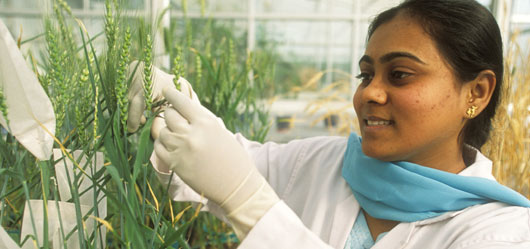FAO's role in biotechnology
Agricultural biotechnologies are being applied to an increasing extent in crops, livestock, forestry, fisheries and aquaculture and agro-industries, to alleviate hunger and poverty, assist in adaptation to climate change and maintain the natural resource base.
They have not sufficiently benefited smallholder farmers and producers and consumers. More research and development of agricultural biotechnologies should be focused on the needs of smallholders.
In order to produce food in a sustainable way for an additional 2 billion people by 2050, a business-as-usual approach will not be sufficient.
This is especially true in the face of climate change and other forces threatening natural resources like biodiversity, land and water that are essential for food production and agriculture, including forestry and fisheries.
To meet these challenges, science and the application of biotechnologies as well as conventional technologies will play a key role.
Biotechnology and FAO
FAO recognizes that when appropriately integrated with other technologies for the production of food, agricultural products and services, biotechnology can be of significant assistance in meeting the needs of an expanding and increasingly urbanized population. Regarding biotechnology, FAO assists its Member countries and their institutions by:
- Providing them with legal and technical advice. For example, FAO has assisted Bangladesh, Paraguay and Sri Lanka to develop their national biotechnology policies and strategies.
- Assisting them to develop their capacities in agricultural biotechnologies and related issues through technical co-operation and training. This has been done in several countries, including Bolivia, Kenya, Malaysia, Uganda and Swaziland.
- Providing them with access to high-quality, updated, balanced, science-based information. This is done using the Internet, e-mail conferences and newsletters as well as providing them with access to articles, books, glossaries, proceedings and studies published by FAO concerning biotechnologies in food and agriculture.
- Offering them a neutral forum to discuss policy and technical issues related to biotechnology. For example, in 2010, FAO organized the international technical conference on Agricultural Biotechnologies in Developing Countries (ABDC-10) in Guadalajara, Mexico.
Also, FAO hosts the Secretariats of a number of intergovernmental bodies and treaties that deal with some biotechnology-related issues, including the Commission on Genetic Resources for Food and Agriculture (CGRFA), the International Plant Protection Convention (IPPC) and the Joint FAO/WHO Codex Alimentarius Commission.


